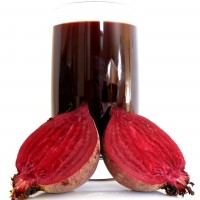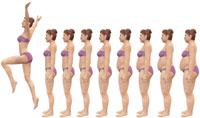Unexpected Facts About Weight Loss
Obesity can be genetic
People with two copies of a specific gene ("fatso") are 60% more likely to be obese and 40% more likely to have diabetes than those who don't have it. Those with only one copy of this gene tend to weigh more as well. According to statistics, about 16% of the population has two copies of this gene, and about half of us - one copy. Moreover, researchers think that there are about 100 of fat genes, although they have a smaller impact on a person's weight than "fatso" gene does.
Stress promotes weight gain
Stressful situations promote cravings for foods rich in carbohydrates (snacks, cakes, etc.). It happens because when we are under stress our body uses a lot of energy; therefore, once the stressful situation is gone, it needs to replenish its energy stores. Stress hormones enhance fat storage as well. This mechanism developed in prehistoric times, when stress meant fighting with wild animals or starvation - extra energy was important for survival. Nowadays we take stress sitting down and extra calories accumulate in the form of excess weight.
Sleep more to lose more
Researchers have found out that sleep deprivation upsets the balance of hormones and triggers an increase in a hormone called ghrelin (it's responsible for the feeling of hunger) and decrease in leptin (it's responsible for the feeling of satiety). Such hormonal imbalance results in overeating and eating even when we are not hungry. Obesity experts say that 7 or 8-hour sleep can become the easiest and cheapest obesity treatment for many people.
Sex doesn't replace a cardio workout
Physical activity can promote shortness of breath and make our heart beat faster, so it's reasonable to assume that sexual activity can burn lots of calories (most people think that the numbers vary between 100 and 300 kcal). However, the truth is that the level of energy expenditure during sex is similar to that achieved during moderate-pace walking - most of us burn about 21 kcal during sexual intercourse.
Related Articles
-
The Best Healthy Eating Plan for Weight Loss Supplements
Being overweight or obese doesn’t only place a person at risk from
-
Idiot Proof Diet - Diet Review
Being overweight doesnt happen overnight. It happens a few pounds at
-
Lose Thigh Fat
Lose thigh fat benefits both our looks and our health. Despite there
-
How To Lose Weight Over 40
I’ve been told that 40 years old isn’t middle age anymore as more
-
How to lose weight fast and healthy?
The first step you should take is to adopt healthier eating habits. No
-
Ardyss Body Magic 2 Step System
Welcome to my Ardyss Body Magic 2 Step System Overview. The Body Magic
- DON'T MISS
- Why to loose weight
- Time To Start Living Your Best Life
- Propylene As Seen On Tv
- Signature Lines on Weight Loss Websites
- Fat Burning Furnace - Fast Quick Weight Loss in Just 50 Days!
- Hydrate to Lose Weight: The Real Skinny On Water Retention and Sodium
- Learn How I Lost 150 Pounds in Just 14 Months
- Burn More Fat - How to Burn More Fat
- The Second Half of My Life
- 3 Powerful Weight Loss Tips




